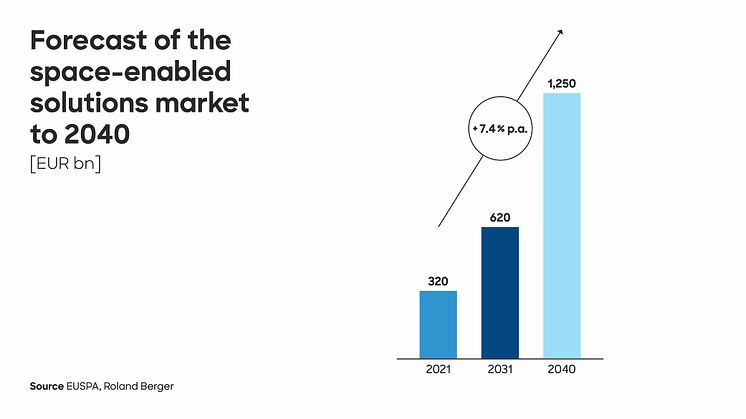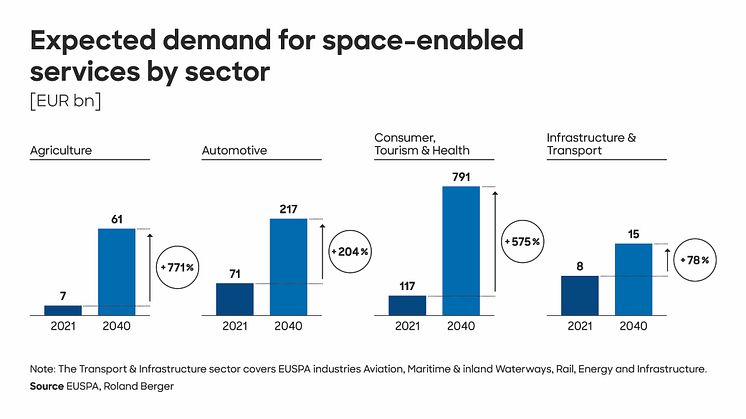
Press release -
Forecast: Global market for space-enabled solutions to grow to EUR 1,250 billion by 2040
- Space applications provide precise data that can increase efficiency in manufacturing, logistics, or resource management across numerous industries
- Demand for space-enabled solutions in the automotive sector will triple from EUR 71 billion (2021) to EUR 217 billion (2040)
- Compared to other nations, Germany has yet to fully exploit the potential of space applications
Munich/Berlin, October 2023: The global market for space-enabled applications is set to grow from around EUR 320 billion in 2021 to over EUR 1,250 billion by 2040. Such solutions are increasingly in demand in various industries like agriculture, healthcare, and automotive, to contribute to more efficiency and competitiveness through smart applications. These are the key findings of the joint study, "Space-enabled Germany: Why Space is crucial to Germany's economic competitiveness, sovereignty, and sustainability goals" by Roland Berger and the Federation of German Industries (BDI).
"Germany has many innovative companies operating in various sectors of the economy. But given the scale of the international competition, our country must actively defend this leading role every day so as not to lose ground. We are convinced that an important step towards improving Germany's competitiveness lies in the systematic use of space-enabled solutions. These facilitate innovative applications that are especially useful as we tackle the transformation to a sustainable economy," says Stefan Schaible, Global Managing Partner at Roland Berger.
"The importance of space is changing fundamentally. The race for German industry's future competitiveness on earth will be decided to a large extent in space," says Siegfried Russwurm, President of the BDI. "Space applications are of crucial importance for the future of industrial nations. Data generated and transmitted by satellites will be indispensable for German industry in particular, be it for autonomous driving, smart farming, or Industry 4.0 applications. The German government therefore needs to be more ambitious in the space context. Greater public and private sector investment is needed."
Immense future market potential for space-enabled applications
The space industry encompasses more than just the production of launch vehicles and satellites. First and foremost, it generates space-enabled solutions. These are applications based on space signals and data, such as satellite communications, navigation, or meteorology. To determine the future market potential of these, the study authors developed a model that forecasts expected demand from 17 different sectors of traditional industry. They found that the greatest potential lies in the following three sectors.
The agriculture sector has the strongest anticipated increase in demand for space-enabled services, which are set to grow 771% from EUR 7 billion in 2021 to EUR 61 billion in 2040. Satellite technology enables smart farming by providing real-time data on weather or soil conditions, which can increase crop yields and reduce resource consumption. Consumer goods, tourism, and healthcare are forecast to see demand rise 575% from EUR 117 billion in 2021 to EUR 791 billion in 2040. The drivers here include the increasing connectivity of smartphones and wearables and the growing use of location-based apps such as fitness trackers. The automotive industry will see demand triple from EUR 71 billion in 2021 to EUR 217 billion in 2040 – stimulated by the rise of autonomous driving and smart mobility services that require continuous data exchange between vehicles and traffic infrastructure via satellite-controlled navigation.
Space applications can offer three key benefits for a wide range of industries: They enable more accurate data and analytics that increase efficiency in manufacturing, logistics, and resource management. By allowing processes to be monitored using satellite and IoT data, they enable real-time quality control, which can improve product quality. And not least, they help monitor environmental impacts. This can support sustainable solutions as well as environmental compliance.
Germany invests less than the international benchmark
In relation to their gross domestic product, the United States invested four times and France more than twice as much as Germany in the space sector in 2022. The German economy also lags behind other space nations in private sector investment. In the period 2013 through 2022, the United States saw EUR 73.0 billion in private investment channeled into space exploration corporations offering space-enabled solutions, and China EUR 62.2 billion. The figure in Germany, by contrast, was just EUR 0.9 billion.
The study found that the hurdles in Germany lie in a low level of awareness of the potential opportunities among company leaders in traditional industries, lack of access to talent, limited availability of industry-specific use cases, and a lack of clarity around Europe's ambition to create sovereign infrastructures. The study authors analyzed the political and economic framework of spacefaring nations and present numerous recommendations for the further development of the space sector in Germany.
Topics
Categories
About Roland Berger
Roland Berger is the only management consultancy of European heritage with a strong international footprint. As an independent firm, solely owned by our Partners, we operate 51 offices in all major markets. Our 3000 employees offer a unique combination of an analytical approach and an empathic attitude. Driven by our values of entrepreneurship, excellence and empathy, we at Roland Berger are convinced that the world needs a new sustainable paradigm that takes the entire value cycle into account. Working in cross-competence teams across all relevant industries and business functions, we provide the best expertise to meet the profound challenges of today and tomorrow.
About BDI
The BDI is the umbrella organization of German industry and industry-related service providers. 39 industry associations, 15 state representations and more than 100,000 companies with around eight million employees make the association the voice of German industry. The BDI is committed to a modern, sustainable and successful industry in Germany, Europe and the world.





